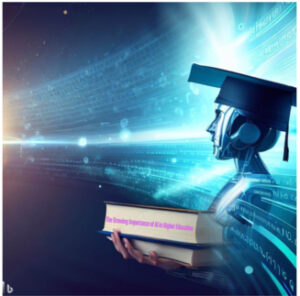
Integrating Artificial Intelligence (AI) into higher education is revolutionizing how institutions operate, teach, and interact with students. From administrative efficiency to personalized learning experiences, the impact of AI is far-reaching, transforming the traditional education model into a more dynamic and adaptive system. In this blog post, we will delve into how to Navigating the AI Frontier in Higher Education Business Wire that provides comprehensive insights and real-world applications shaping the future of academia.
The Growing Importance of AI in Higher Education

Navigating the AI frontier in higher education, Business Wire has revealed the growing emphasis on technology-driven solutions within the academic landscape. Universities and colleges are leveraging AI to streamline admissions, student support, curriculum development, and campus security. The incorporation of AI is not just limited to enhancing administrative functions; it’s also playing a pivotal role in driving student engagement and learning outcomes.
Transforming Student Experiences
One key area where AI is making a significant impact is improving student experiences. With the help of AI-powered chatbots, institutions provide round-the-clock support to students, answering queries related to course selection, campus facilities, and even mental health resources. Chatbots powered by Natural Language Processing (NLP) have become virtual assistants that help students navigate their academic journey more efficiently.
Furthermore, personalized learning platforms use AI to analyze individual learning patterns, recommend customized content, and suggest areas of improvement. This personalized approach allows students to learn independently, increasing retention rates and academic performance.
Navigating the AI frontier in higher education Business Wire has highlighted several case studies where institutions successfully implemented these AI-driven tools, resulting in increased student satisfaction and success rates.
Enhancing Administrative Efficiency
Administrative tasks such as managing enrollments, tracking student attendance, and scheduling classes can be labor-intensive. AI solutions have automated many of these processes, reducing the workload on staff and minimizing human errors. For example, predictive analytics is being used to forecast enrollment trends, helping institutions better plan their resources.
Navigating the AI frontier in higher education, Business Wire explains how these advancements have allowed administrative staff to focus on more strategic activities, such as student outreach and engagement, rather than getting bogged down by routine paperwork.
AI in Research and Development
AI is also crucial to research and development within higher education. Machine learning algorithms are being used to analyze vast datasets, identify trends, and derive previously inaccessible insights. This is particularly beneficial in fields like genomics, environmental studies, and data science, where traditional methods of data analysis would take significantly longer.
Navigating the AI frontier in higher education, Business Wire has reported numerous partnerships between universities and tech companies to foster innovation through AI. These collaborations are driving breakthroughs in academia and industries that rely heavily on research and development.
Challenges and Ethical Considerations
Despite its many benefits, integrating AI into higher education comes with its own set of challenges. Data privacy, algorithmic bias, and the ethical implications of using AI in decision-making are significant concerns. Navigating the AI frontier in higher education, Business Wire emphasizes the need to establish clear guidelines and policies to ensure that AI is used responsibly and ethically in educational settings.
Institutions must invest in training faculty and staff to understand AI’s capabilities and limitations, ensuring that the technology augments human intelligence rather than replaces it. Addressing these challenges head-on will be crucial to maximizing AI’s benefits while minimizing potential risks.
Future Prospects and Trends
The future of AI in higher education looks promising, with emerging trends such as adaptive learning technologies, AI-driven research labs, and intelligent tutoring systems gaining traction. Navigating the AI frontier in higher education, Business Wire projects that AI adoption will continue to rise, with more institutions exploring the potential of these technologies to enhance academic and administrative functions.
Moreover, as AI becomes more sophisticated, there will be a growing need for interdisciplinary courses that teach students how to develop, manage, and ethically use AI. This could lead to new academic programs and research centers dedicated to AI and its applications in various fields.
AI-Driven Decision-Making in Higher Education
One of the most transformative aspects of AI is its ability to assist in data-driven decision-making. Navigating the AI frontier in higher education, Business Wire highlights that universities utilize advanced algorithms and data analytics to make informed decisions about everything from curriculum design to financial planning. For instance, AI systems can analyze data on student performance and feedback to identify gaps in the curriculum or areas where additional resources may be needed. This allows institutions to be more agile and responsive to student needs, improving overall educational quality.
Additionally, predictive analytics is used to identify students at risk of dropping out. AI systems can flag at-risk students early by analyzing factors such as attendance records, grades, and engagement levels, allowing faculty and support staff to intervene with targeted assistance. This proactive approach has been shown to reduce dropout rates and increase student retention, a critical metric for institutional success.
AI-Powered Learning Analytics and Insights
AI-powered learning analytics platforms provide deeper insights into student learning patterns and behavior. By tracking how students interact with course materials, AI systems can generate detailed reports that help instructors understand which topics are challenging for students and which teaching methods are most effective. This data can then be used to refine course content and teaching strategies to better align with student needs.
Navigating the AI frontier in higher education, Business Wire notes that these insights are invaluable for improving academic performance and enhancing the overall learning experience. For example, if the data shows that students spend more time on a particular module, instructors can introduce supplementary materials or schedule additional tutorials to address this issue. This level of insight and adaptability was previously unattainable with traditional teaching methods.
Virtual Classrooms and AI-enhanced learning Environments
The COVID-19 pandemic has accelerated the adoption of virtual learning platforms, and AI has played a pivotal role in making these environments more interactive and engaging. AI-driven tools such as virtual teaching assistants, interactive simulations, and intelligent tutoring systems enrich the online learning experience by providing real-time feedback and support to students. These tools can simulate real-world scenarios, offer personalized feedback, and even adapt lesson plans based on the student’s performance.
Navigating the AI frontier in higher education: Business Wire reports that institutions embracing these technologies have seen a marked improvement in student engagement and satisfaction with online courses. AI is enabling a shift from passive content consumption to active learning, where students can interact meaningfully with course materials.
AI-Enhanced Campus Security and Safety

Campus safety is a top priority for higher education institutions, and AI is crucial in ensuring a secure environment. AI-powered surveillance systems are being deployed to monitor campuses for suspicious activity, alerting security personnel in real time. Facial recognition technology is being used to control access to restricted areas, while predictive analytics are helping institutions anticipate potential security threats.
Navigating the AI frontier in higher education Business Wire points out that AI is making campuses safer and more efficient in managing resources. For example, AI-driven systems can optimize energy usage, manage maintenance schedules, and control building access, creating a more sustainable and secure campus environment.
Discover More Posts That Might Catch Your Interest – Best Summer Vacation Destinations in USA
The Role of AI in Expanding Access to Education
One of the most promising applications of AI in higher education is its potential to expand access to quality education, particularly for underserved communities. AI-powered platforms can offer online courses, provide automated tutoring, and even assess student performance at scale, making it feasible for institutions to reach a larger and more diverse student population.
Navigating the AI frontier in higher education Business Wire emphasizes that AI is breaking down barriers to education by providing flexible and affordable learning opportunities. Students from remote areas, working professionals, and individuals with disabilities can now access high-quality education previously out of reach. This democratization of education can potentially create a more inclusive and equitable educational landscape.
AI and Faculty Development
While much of the focus has been on how AI benefits students, it also transforms how faculty members approach teaching and research. AI tools are helping educators develop more effective teaching strategies, conduct complex research, and manage administrative tasks more efficiently. For example, AI-driven plagiarism detection tools are helping faculty ensure academic integrity, while automated grading systems reduce the time spent on routine assessments.
Navigating the AI frontier in higher education Business Wire highlights that AI is a tool for enhancing educational delivery and a catalyst for professional development. Faculty members can use AI to gain insights into their teaching methods, identify areas for improvement, and stay updated on the latest research trends. This ongoing development is crucial for maintaining a high standard of education in an increasingly competitive academic environment.
Strategic AI Partnerships in Higher Education
As institutions recognize AI’s transformative potential, many are entering into strategic partnerships with technology companies to accelerate AI adoption. Navigating the AI frontier in higher education, Business Wire has covered several collaborations between universities and leading tech firms such as IBM, Microsoft, and Google. These partnerships facilitate the development of AI-powered research centers, innovation labs, and academic programs dedicated to AI and its applications.
Such partnerships provide institutions with access to cutting-edge technology and expertise and create opportunities for students and faculty to work on real-world projects. This hands-on experience is invaluable in preparing students for careers in AI and related fields.
The Future of AI in Higher Education

AI is poised to become an integral part of every aspect of higher education. Institutions that successfully navigate the AI frontier in higher education Business Wire will be better positioned to attract top talent, deliver high-quality education, and conduct groundbreaking research. The ongoing advancements in AI technology, coupled with a growing emphasis on interdisciplinary learning, suggest that AI will profoundly shape the future of higher education.
To ensure a smooth transition, institutions must prioritize ethical considerations, invest in faculty training, and establish clear guidelines for AI use. By doing so, they can harness AI’s full potential while safeguarding the values of academic integrity, inclusivity, and human-centric learning.
Conclusion
Navigating the AI frontier in higher education, Business Wire provides a comprehensive view of how AI transforms the academic landscape. From improving student experiences to enhancing research capabilities and administrative efficiency, AI is integral to higher education. However, with this integration comes the responsibility to address ethical concerns and ensure that AI supports, not hinders, human development.
The continued exploration and adoption of AI technologies will undoubtedly reshape the future of education, making it more accessible, personalized, and impactful. As institutions move forward, they must strike a balance between innovation and responsibility, leveraging AI to create a more inclusive and effective learning environment.
By staying informed through reliable sources such as navigating the AI frontier in higher education Business Wire, educators, administrators, and students can collectively shape a brighter academic future.







